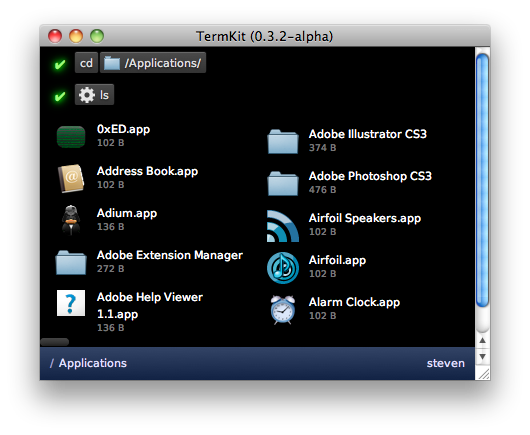termkit like konsole
Page 1 of 1 (3 posts)
|
Registered Member 
|
do a next generation konsole with cool features like termkit.
maybe with kparts...  termkit allows you to view some operations differently : show images, pdf, ls command shows files with previews or icons. http://acko.net/blog/on-termkit/ is a site explaining the concept of termkit with interesting other photos.
Last edited by sylvaing on Sun Apr 01, 2012 4:23 pm, edited 1 time in total.
|
|
Manager 
|
Could you be more specific when posting an idea by including more then just a link to a product. It would be helpful to include details like what features/functionality it provides that are not currently available in Konsole and maybe include pics
|
|
Registered Member 
|
Termkit is a pretty cool concept which attempts to merge the graphical file browser with the terminal, creating a hybrid graphical terminal.
Termkit commands output typed data streams (kind of similar to windows powershell or web content) which termkit knows how to interpret and display in a graphical manner (allowing it to act as a generic file viewer and file browser), and which can be piped into other supported commands similar to standard unix pipes (closer to windows powershell's relevant concept). Lastly, termkit's command prompt supports graphical command-completion (such as one would expect from a modern IDE). For integration with konsole (or creating a next-generation konsole) these would be two distinct projects which can be implemented independently. The graphical command completion is by far the easiest of the two as it would mostly mean intercepting bash/gettext completion requests and displaying the results in a drop-down list instead of printing it to the terminal. The typed data stream and graphical content display would be much harder because it requires re-implementing most of the command-line tools that people expect to be available (or replacing the entire environment) as well as adding some (plugin?) mechanism for displaying various types of content. Graphical content display would be nice if we can find a way that uses the standard structured text output provided by the various command-line tools, so that it can do things like display a collection of file icons and names when someone uses the ls command (include the details when including other flags like -l), or display the actual file when someone uses the cat command.
airdrik, proud to be a member of KDE forums since 2008-Dec.
|
Page 1 of 1 (3 posts)
Bookmarks
Who is online
Registered users: Bing [Bot], Google [Bot], Sogou [Bot]







